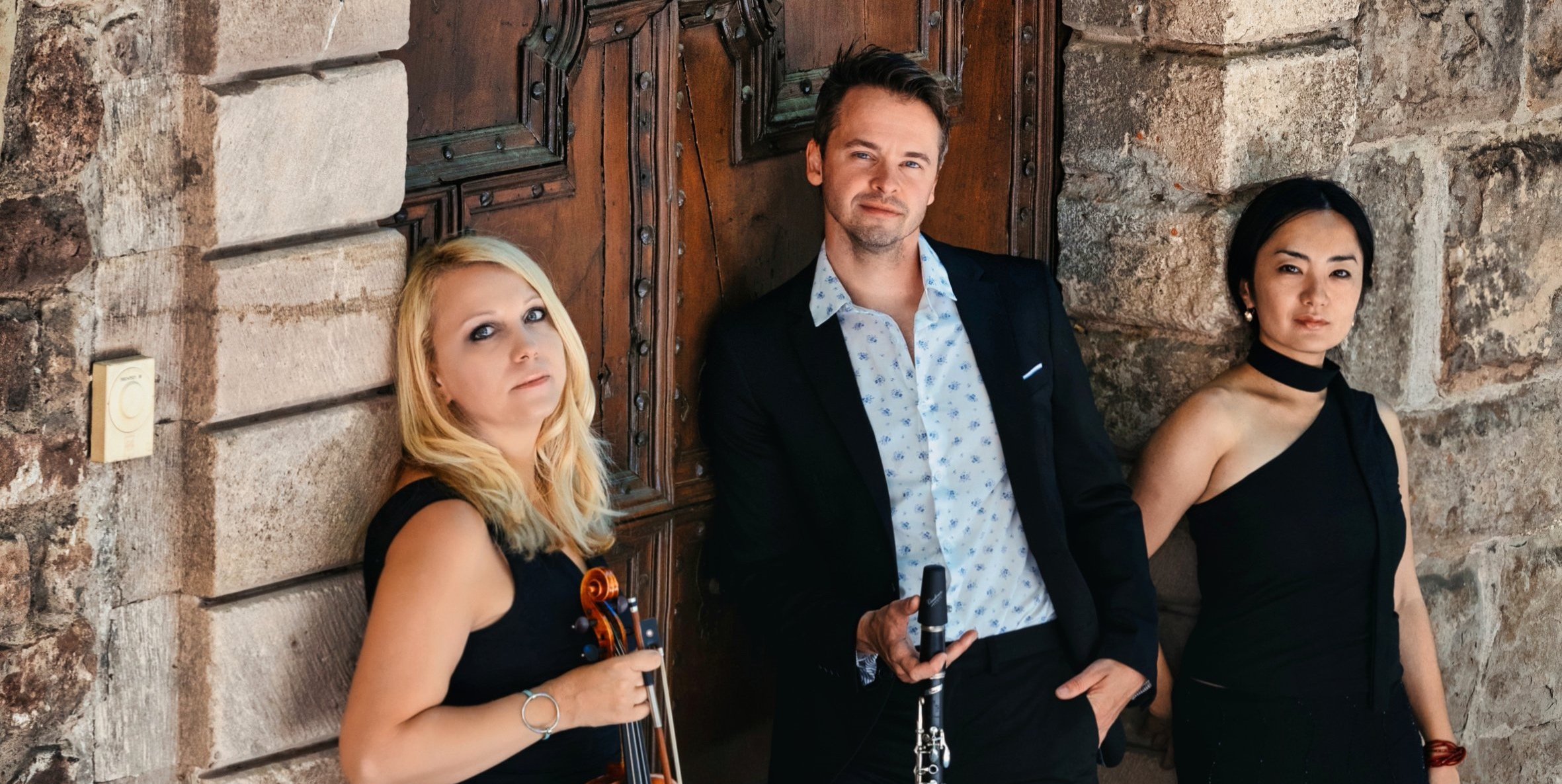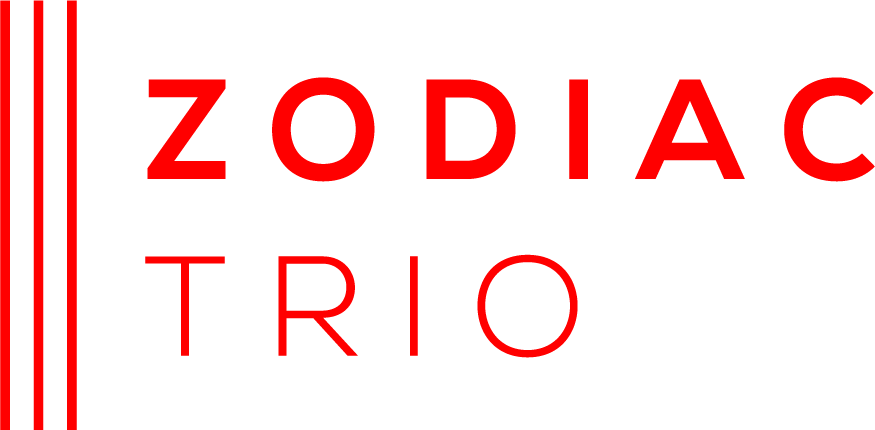
Presenter Testimonies
“The Zodiac Trio’s passion and artistry are nothing short of exhilarating”
Thank you from the bottom of my Slavic soul for bringing that fascinating and exquisitely performed program to the Richard Bradshaw Amphitheatre yesterday. The Zodiac Trio’s passion and artistry are nothing short of exhilarating and I know I speak for all present when I say that yesterday’s concert was a profound and memorable experience for which we are deeply grateful. The Zodiac Trio is an inspiration to us all and the world would be a better place if there were more people like them! So THANK YOU, THANK YOU, THANK YOU!
- Nina Dragonic, Director of Programming, Canadian Opera Company,
Chamber Music Series at the Richard Bradshaw Amphitheatre
(Toronto, CANADA)
“Zodiac Trio’s brilliant performance opens the 2017-2018 Oceanside Classical Concerts Season”
Usually, the instrumental mix for a classical trio would be piano, violin and cello. But The Zodiac threesome have discovered the magic that happens with a trio of piano, violin and clarinet. The result of their discovery was centre-stage for Oceanside Classical Concerts (OCC) on Wednesday October 18 to a sold-out crowd at Knox in Parksville. Cheers, whistles, standing ovations said it all. The performance was, in a word, brilliant.
Kliment Krylovskiy, clarinet, has received praise for his “easy facility…vibrant tone…expressiveness and exuberance”.
Krylovskiy’s playing shone throughout the performance at Knox. His technique was astoundingly evident in Klezmer Fantazye (Andrew List). Wistful colours were expressed in the traditional style of the Ashkenadi and Sephardic Jews dating back 3000 years, with the unique klezmer scales/runs/glissandos and often-used staccato finishes. The rich tones from the clarinet were at times melted chocolate…and then glistening rays of sunlight; throughout, Kliment’s sensitive playing was matched by masterful technique.
Vanessa Mollard, violin, was outstanding. Her skills were boldly on display in her performance of Chaconne, a Baroque work for violin and piano composed by Tomasso Antonio Viteli, then edited by Ferdinand David (friend of Felix Mendelssohn) and edited again by Leopold Charlier in 1911. The piece presented a theme, then worked through variations on that theme, each one being more and more taxing, finishing in staggering technical difficulty. The harmonious variations of the piano were complex, providing strong and underlying support. Viteli, David and Charlier would have been amazed by this performance.
Riko Higuma, piano, is “a highly sought-after piano collaborator and a sensitive chamber musician”. It’s easy to see why. She is the perfect pianist for this trio – true sensitivity, spectacular technique. Riko’s solo, Chopin’s Revolutionary Etude (op. 10 no 12) left the OCC audience in utter awe. Chopin composed the piece during the time of the Russian bombardment of his homeland, Poland, and the unsuccessful attempt at revolution against Russia. Riko’s interpretation was impeccable – Chopin’s angst and anger exploded from the piano with the furious bass and the pounding treble.
The trio’s program was designed flawlessly. The opening piece, Trio for Clarinet, Violin and Piano (Aram Khachaturian), set the tone for the first half with Eastern European influences trading melodies between the violin and the clarinet, with the piano creating the togetherness of it all.
Three Duets (Dmitriy Shostakovich) were written for violin and piano but, for the Zodiac, were transcribed for violin, clarinet and piano. The duets between the violin and clarinet were gorgeous, with the piano flowing gently like water underneath. The Gavotte (2nd movement) was perfectly dance-y. The violin and clarinet stepped ever-so-lightly with one another. The Waltz (3rd movement) described the celebratory scene – a ballroom of whirling gowns in all their splendor.
Astor Piazzolla’s works from the “Angel Series” (Muerte del Angel and Milonga del Angel) opened the second half. Here, the Tango was the star. The dancers were clear in the listener’s minds…in a dark club, oozing with passion…then, fiery and insistent. This was Piazzolla at his best, in the hands of this trio.
Romance was in the air with Andante and Allegro (Ernest Chausson). The piano’s opening for Andante was lovely, a welcoming and calm preparation. Kliment’s clarinet entered like a breeze through an open window, gauzy curtains softly moving. The clarinet’s long flowing lines were simply beautiful. The Allegro, with violin and clarinet trading parts and piano adding the backdrop, was flitting birds and butterflies. The technique here…the runs, the arpeggios…was astounding.
The program finished with Serenade for Three (Peter Schickele). This was a finale of perfect choice. Each of the Zodiac players took turns with the melody lines, playing tag, chasing each other in this festive work. The celebratory tone, with the joyous dance-y lines and the outwardly exuberant Appalachian-style hoedown, wrapped up the concert with more cheers, whistles and more well-deserved standing ovations.
A spectacular performance by three outstanding players. “The Zodiac Trio is recognized worldwide to be among the foremost clarinet-violin-piano ensembles performing today” – clearly demonstrated in their concert at Knox.
article by Mary Leigh-Warden
“We were constantly drawn to admire uncompromising musicianship, the concert was marvelous fun.”
On a recent Sunday afternoon, Castle Rock received a stunning indication of the direction twenty- first century music is going. The Zodiac Trio played a concert at Christ’s Episcopal Church such as has seldom been heard in the high plains desert. Rooted and
thoroughly at ease in their sophisticated international milieu, a Japanese pianist, a Russian clarinetist and a French violinist - all met at the Manhattan School of Music – played a program that would have challenged the immortals of their profession. Their delight in the selected compositions – most demanding fiendishly intricate mastery – left their audience awed by a self-assurance that at moments appeared to approach nonchalance. While we were constantly drawn to admire uncompromising musicianship, the concert was marvelous fun.
The music of Astor Piazzola is, at last, entering the global concert repertoire. The Trio played two of his better-known “new tango” pieces. “Summer” and “Autumn” from his “Four Seasons” established the deeply intimate dialogue among the instruments that can be said to be the voice of the Zodiac’s muse. Nuances of phrasing that at once placed The Trio among the world’s finest chamber ensembles reminded the audience again and again of the wordless bond that sets musicians apart from the rest of humanity. In the growling, opening violin scrapes of Piazzola’s “Autumn”, we “beheld” his new vision for the tango form, demanding utter – even visionary - perfection in performance.
All three of the Zodiac confessed to having committed themselves to their art by the age of ten, the violinist at four. Charming and comfortable in an adopted language, they presented the face of a new, world vision of music. I noticed Riko Higuma, the pianist, smiling to herself while gracefully disposing of the sturm und drang of Chopin’s “Revolutionary Etude”, a composition of punishing demands. Raised eyebrows with a hint of a smile were exchanged between the violinist and the clarinet player during Alexander Arutiunian’s Trio that hauntingly evokes the romantic past of eastern European music. These young people were enjoying themselves as much as their audience. Yet, often, they played as though possessed. While the Zodiac passion can come close to intimidation, it’s also infectious, the cosmic exhortations of their composers driving performances of breathtaking precision and dimension.
A composition assigned to Khachaturian while a student at the Moscow Conservatory is his only chamber work, but its searching complexity startles and rewards with discovery, as did every selection on The Trio’s program.
The wry contrasts of Prokofiev’s Waltz from his “Cinderella Ballet Suite” reminded us of the menace and ironies that haunted the composer in the Soviet Union while Saint-Saens’ Tarantella, a trifle old-fashioned perhaps, reminded us that the composer wrote the score for a pioneering film in 1908.
Vanessa Mollard, a shy Niçoise with a darting glance, plays a relatively new violin that delivers an immense breadth of expression. From that instrument she draws subtleties that might break the hearts of her composers, plucking a pizzicato range of astounding sensitivity.
Between muttered threats to his two reeds made truculent by our high, desert climate, Kliment Krylovsky played a clarinet that swept this reviewer back to the Benny Goodman concerts at Carnegie Hall. We heard a lilting, yearning sound that was greatly satisfying to the soul, leaving the listener with a tantalizing string of the unanswered questions only a clarinetist on the top of his form can raise.
Admitting that she gets a kick out of playing the piano, Riko Higuma – whose stature is less than large - looks as though it might be jazz when it’s really Chopin, her fingers and foot imparting to the 9-foot Steinway Concert Grand her confident delight bordering on lightheartedness that masks profound musicianship.
Each with a deeply informed yet inquiring sound, these three are simply different from all others. They’re philosophers as well as musicians and their career together will bring sublime delight to audiences in the decades ahead. Inventive - even daring - The Zodiac Trio’s level of perfection has freed them from the fetters of mere technique. In a smallish church in Castle Rock Colorado we heard them soaring into the firmament of greatness. And they’re welcome back - any old time.
“I can’t thank you enough for giving your all to our little series”
I received many, many compliments after your concert here in Quogue and about what a wonderful group I had brought in. They spoke of your talent, your repertoire and your personalities and what a special evening it was. I can't thank you enough for giving your all to our little series
Jane Deckoff, Artistic Director
Quogue Chamber Music Festival
(Quogue [Hamptons] NY)
“The best concert in the series’ 20-year history!”
The concert was terrific artistically, and as Kathy said, one of our long-time subscribers told her, ‘The best concert in the series’ 20-year history!’
- Harry Strub, Artistic Director
Virtuosi Concert Series
(Winnipeg, CANADA)
“The Best That I’ve Ever Heard...”
The best that I’ve ever heard [of Bartok’s “Contrasts”…] incredibly precise and fine sound.
- Jan Narveson, Kitchener-Waterloo Chamber Music Society
(Kitchener, CANADA)
“...A stellar experience for our audience”
The evening was definitely a stellar experience for our audience. The musicianship was superb, and the trio has such a lively character in performance. We are honored to have had you.
- Kathy Barr,
Old First Concerts
(San Francisco, CA)
